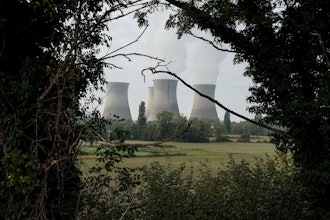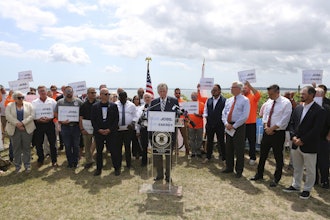
CARSON CITY, Nev. (AP) — Nevada lawmakers are considering a massive energy infrastructure proposal that would encourage the construction of renewable energy transmission lines and electric vehicle charging stations and hasten the state's transition away from fossil fuels.
Sen. Chris Brooks, a Las Vegas Democrat, introduced a bill on Thursday that would encourage the utility provider NV Energy to prioritize building new transmission lines that can facilitate renewable energy use in homes and businesses throughout the state. The bill calls for a $100 million investment in transportation electrification through five programs that would install electric vehicle charging stations in cities and on highways throughout Nevada.
Brooks said building out transmission lines would allow Nevada to purchase and sell renewable energy throughout the region and prevent blackouts and shortages like those that occurred in Texas this winter.
“We could develop transmission lines across the state of Nevada and be able to access wind in Wyoming, solar in the Southwest, hydropower in the Northwest and provide power to our neighbors in southern California and central California,” Brooks said.
At a Thursday roundtable, Gov. Steve Sisolak said Nevada's “clean energy economy” had already created thousands of jobs in the solar industry and, if the proposed infrastructure projects are built, will likely generate more.
“Clean energy is intrinsically linked to Nevada’s job recovery and economic opportunities, in addition to prioritizing reliable electricity and stable rates,” he said.
The Nevada proposal mirrors similar legislation under consideration throughout the region, including in Colorado. It also dovetails with President Joe Biden's plans to increase the use of renewable energy, modernize the country's aging electrical grid and incentivize drivers to trade their gas-powered vehicles for electric ones.
Brooks said Nevada was well-positioned to be a leader in renewable energy for several reasons: It neighbors the economic juggernaut state of California, already has solar, wind and geothermal energy facilities and has vast public lands that will make it easier to build transmission lines. He said his bill would allow the state to use federal infrastructure funds toward electrification, transmission and other infrastructure.
“This is creating the pipeline by which we can funnel that money into projects,” he said.
The proposal encourages further use of rooftop solar and offers tax rebates to companies building energy storage facilities that hold power produced through renewable sources like wind, solar or hydropower.
It also directs investment toward low income and minority communities. Under current law, at least 5% of utility expenditures must go toward energy efficiency programs for low-income customers. If Brooks’ proposal passes, the requirement will be doubled to 10%.
“We know already that Black and Latino families and communities are disproportionately affected by the harms of pollution. That means that marginalized groups are more likely to live in areas that are negatively affected by climate change,” said state Sen. Fabian Doñate, a Las Vegas Democrat. “This bill will also allow us the opportunity to invest in neighborhoods that don’t already have access to clean energy technology and infrastructure. We can finally begin to place charging stations in parts of East Las Vegas or even start to install solar panels in mixed housing units that need this the most.”






















